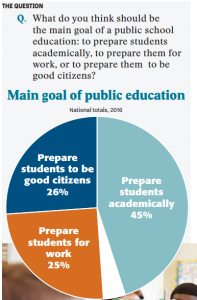- Facebook232
- Threads
- Bluesky
- Total 232
 The annual Phi Delta Kappa survey of public attitudes toward education is out.
The annual Phi Delta Kappa survey of public attitudes toward education is out.
Adults are asked whether preparing students to be good citizens is important and how well schools are doing it. Eighty-two percent say it’s extremely or very important, and 33% say schools are doing it extremely or very well. As a priority, it ranks somewhat below developing work habits and providing factual information, it ties with critical thinking, and it comes ahead of working in groups.
In a different question, respondents are asked to pick the single main goal of education. About a quarter choose preparing students to be good citizens, which is on par with preparing students for work but behind preparing students academically.
The advantage of a forced choice is that most people will favor a whole set of good outcomes if allowed to pick them all. However, there’s something a little artificial about the results of a forced choice. My job is to study and advocate for civic education, so I’d pick the “citizenship” choice. I nevertheless believe that preparing students academically and for work are essential goals, and are complementary with civics. So it’s not the case that 26% of Americans think only citizenship matters, or that 74% think it doesn’t matter at all.
Still, the forced-choice reveals that education for citizenship is the top priority for quite a few Americans. That’s valuable to know, because the major reforms that have passed through education like earthquakes’ seismic waves since 1980 have hardly mentioned civics at all. The PDK survey doesn’t prove that Americans put the civic mission of schools above all else, but it does suggest a lot of support, which ought to be reflected in policies.
Further, the forced choice reveals differences within the public. It appears that the civic mission is most important to young and older citizens; parents and other adults in the traditional child-rearing years are more concerned about academics.
There’s also a partisan and ideological split: “Fifty percent of conservatives emphasize academics vs. 43% of moderates and 40% of liberals. Liberals instead are more likely (33%) than moderates (24%) and conservatives (22%) to say schools should focus on building citizenship. Republicans are less apt than others to value a role for citizenship instruction in public schools.” The partisan divide creates challenges for proponents of civic education. In my opinion, citizenship should be a core value for conservatives, and it’s important to make that case.
The PDK poll doesn’t ask people what they mean by “good citizens.” We know from other studies that answers would vary. Some think of good behavior–obedience in the kindergarten classroom or staying out of trouble as a teenager. Others think of patriotism and support for the regime; still others, of activism and debate. Note that support for citizenship education is strongest among liberals and young people, and I doubt that most of them favor simple obedience.
One thing we can conclude is that good citizenship shouldn’t be an afterthought for policymakers, for 82% of adults think it’s at least very important, and 26% think it’s the main goal of schools.